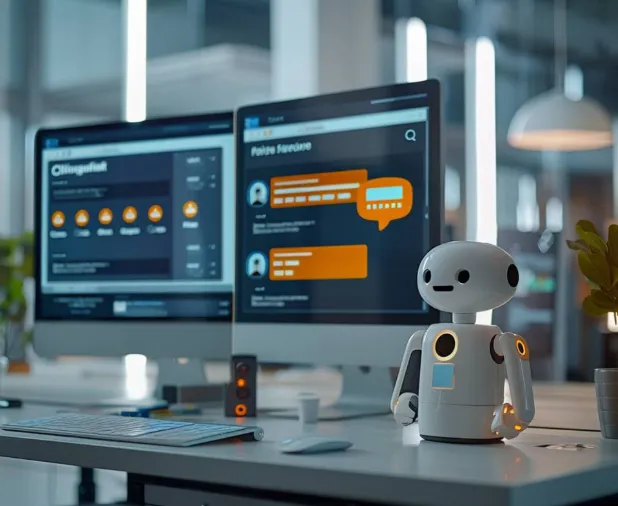The digital marketplace is constantly shifting, and businesses are under pressure to find smarter ways to connect with their audiences. One of the most significant developments in recent years has been the rise of chatbots. Once viewed as a passing trend, these virtual assistants have now become a core part of how companies engage, support, and retain their customers.
Why Chatbots Matter in Modern Marketing
At their core, chatbots are designed to simulate human conversation, whether through text or voice. What began as simple, rule-based programs has matured into sophisticated systems powered by natural language processing (NLP) and machine learning. Today, they not only respond to basic questions but also analyze behavior, personalize interactions, and deliver insights that help businesses make better decisions.
This shift has changed the way brands think about customer engagement. Where businesses once relied heavily on phone calls and email, consumers now expect immediate, digital-first experiences. Chatbots fill this gap by offering instant communication, consistent service, and availability at all hours.
Understanding the Different Types of Chatbots
Not all chatbots function the same way. Broadly, they fall into three categories:
- Rule-based bots follow a script of predefined responses, ideal for simple inquiries like FAQs.
- AI-driven bots use NLP and learning algorithms to adapt to user behavior and provide more natural, context-aware conversations.
- Hybrid bots combine the two approaches, ensuring efficiency while also handling more complex requests.
This flexibility allows businesses to choose the model that best fits their goals and customer needs.
How Chatbots Actually Work
Behind every smooth conversation lies a layered system. The user interface is what customers interact with—whether it’s a website widget, mobile app, or voice assistant. The chatbot engine interprets input, while backend systems store data and manage integrations with other tools like CRMs or e-commerce platforms. NLP is what gives the chatbot its ability to understand context and respond in a way that feels less robotic.
Real-World Applications Across Industries
The practical uses of chatbots span multiple sectors:
- Retail and e-commerce: Guiding shoppers to the right product, offering personalized recommendations, and even processing payments.
- Customer support: Handling common requests such as delivery tracking or account resets, which frees up human agents for more complex cases.
- Healthcare: Scheduling appointments, sending reminders, and offering initial guidance on basic symptoms.
Successful implementations are easy to find. Domino’s Pizza, for example, allows customers to place an order directly through messaging apps. Sephora uses its chatbot to suggest products tailored to individual preferences, while healthcare platforms like HealthTap provide instant, AI-assisted medical guidance.
Benefits That Set Chatbots Apart
- Personalization at scale – By analyzing user behavior, chatbots can make relevant suggestions that create a sense of being understood.
- Round-the-clock availability – Unlike human agents, bots never log off, making businesses more accessible.
- Cost efficiency – Automating repetitive tasks reduces the need for large support teams while still delivering consistent service.
- Actionable insights – Every interaction generates data that can improve marketing strategies and predict customer needs.
These advantages make chatbots more than just support tools—they become key drivers of marketing growth.
Implementing Chatbots Strategically
For businesses considering chatbots, a thoughtful rollout is essential. The first step is defining clear objectives—whether the goal is lead generation, customer service, or boosting sales. From there, companies must select the right platform, design conversational flows that feel authentic, and ensure seamless integration with existing systems.
Just as important is knowing when to escalate to a human agent. Customers quickly grow frustrated if a bot cannot meet their needs, so building a smooth handover process ensures a better overall experience.
Overcoming Common Challenges
While chatbots bring immense value, businesses must address a few hurdles:
- Managing expectations: Being transparent about what a chatbot can and cannot do prevents disappointment.
- Data protection: With increasing concerns around privacy, strict security measures and regulatory compliance are non-negotiable.
- Bias and fairness: Chatbots must be monitored to prevent biased responses and ensure inclusivity.
- Keeping up with technology: Regular updates and improvements are vital as AI evolves.
By anticipating these issues, businesses can turn potential setbacks into opportunities to strengthen trust and performance.
Measuring Chatbot Success
The effectiveness of a chatbot shouldn’t be left to guesswork. Companies can measure success through:
- Response time and how quickly customers get answers.
- User engagement and the number of conversations initiated.
- Conversion rates after chatbot interactions.
- Customer satisfaction scores gathered through feedback.
- Cost savings from automation compared to manual support.
Testing variations in dialogue and tone can also help refine interactions and improve results over time.
The Road Ahead
Chatbots have already proven themselves as powerful allies in digital marketing. Their ability to provide personalization, constant availability, and operational efficiency makes them indispensable for businesses that want to stay competitive. Yet, their potential is still growing. As AI technology advances, chatbots will become even more intuitive, human-like, and capable of handling complex interactions.
Final Thoughts
The integration of chatbots into marketing strategies marks a turning point in how businesses connect with customers. Far from being just automated responders, they act as intelligent partners that drive engagement, loyalty, and growth. Companies that adopt chatbots thoughtfully—while addressing challenges such as privacy and fairness—will be best positioned to thrive in the customer-focused future of digital marketing.
